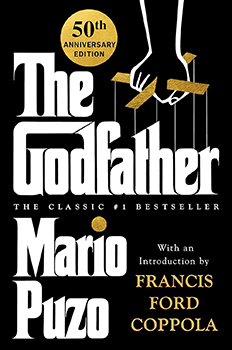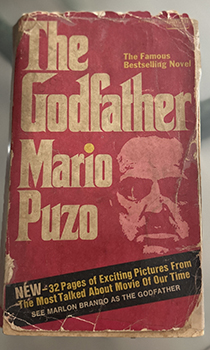

Features Classic Thrills: THE GODFATHER
THE GODFATHER by Mario Puzo
A Spotlight on Classic Thrills
I read Mario Puzo’s master thriller, THE GODFATHER, as a teenager who’d never watched the movie because I found it boring. It was the first novel that captivated me from start to finish, the first book to leave me wondering about the characters for a long time after I finished it. Rich with believable characters, the book proved influential in both my writing and personal life. And no, it doesn’t mean I leave stallion heads in people’s beds. Not yet, anyway.
And with a required “spoiler warning,” let’s dive into what makes this book a classic.
The novel and eponymous film follows the life, death, passions, and deals of the Corleone Family, particularly its first Don, Vito Corleone. It opens with a prologue—a writing that has garnered such a maligned reputation among writers but that here was used to great effect. We meet three people in dire situations, each coming to the conclusion that they need Vito Corleone’s help to resolve them.
-A baker who wants a resident’s visa for the immigrant who got his daughter pregnant. (See how generous the baker was? Another father might have first considered the “gunshot option.”)
-An undertaker whose daughter was savagely beaten up by a group of rich kids who thought laws didn’t apply to them. The undertaker begged Don Vito for revenge.
-A has-been singer and actor who won’t get a coveted movie role because he was enamored with a young starlet whom the head of the movie studio was reserving for himself. (This is the character many people thought was based on Frank Sinatra.)
The actions taken to solve these issues establish the diversity and deep power of The Don.
Not long after, The Don refuses a proposal to get into the drug business, which is the inciting incident for the five mafia families running the New York area to start a war, or as they call it, “go to the mattresses.”
Among the high-ranking casualties were Sonny Corleone, firstborn child of Don Vito and Michael’s first wife, assassinated during his forced exile in Sicily. When Don Corleone finally negotiates a peace agreement among the families, he sets in motion a far-reaching plan that requires you to put on your old Sicilian hat to understand. We see the passing of power to the next generation and Michael later making the hard decisions that would bring back the family’s honor and respect.
The 1972 film and its sequels boosted the novel into pop culture, and now everybody knows about “keeping your friends close, but your enemies closer.”
One point usually misunderstood is the catchphrase people use as an excuse when doing somebody wrong: “I’m sorry this happened to you, but like The Godfather said, you know, It’s not personal. It’s business.”
While it is true that the phrase is mentioned a couple of times in the novel, people tend to overlook the fact The Godfather doesn’t abide by that rule. Michael Corleone sets the record straight toward the end:
“Tom, don’t let anybody kid you. It’s all personal, every bit of business. Every piece of shit every man has to eat every day of his life is personal. They call it business. OK. But it’s personal as hell. You know where I learned that from? The Don. My old man. The Godfather. If a bolt of lightning hit a friend of his, the old man would take it personal. He took my going into the Marines personal. That’s what makes him great. The Great Don. He takes everything personal Like God. He knows every feather that falls from the tail of a sparrow or however the hell it goes? Right? And you know something? Accidents don’t happen to people who take accidents as a personal insult.”
Mario Puzo penned other novels. Sadly, they didn’t reach the popularity of The Godfather, but they are excellent crime fiction books, my favorite among them The Last Don.
I’m tempted to divert into a commentary about the films, especially the greatly underrated Part III, but since the objective of this column is to motivate you to read classic thrills (instead of watching the films based on them), I’ll acknowledge that those films are among the best adaptations of all time.
The author also enjoyed a prominent script-writing career, including credits for 1978’s Superman—the film that proved superhero stories could be commercially successful films.
In short, there’s a chance there wouldn’t even be an MCU or Snyderverse if it wasn’t for Mario Puzo, at least not in this version of the multi-verse.
Classic Thrills: THE GODFATHER
- Mark Greaney by José H. Bográn (VIDEO) - June 27, 2024
- Brian Andrews & Jeffrey Wilson by José H. Bográn (Video) - May 23, 2024
- Classic Thrills: THE DAY OF THE JACKAL by Frederick Forsyth - May 10, 2024


